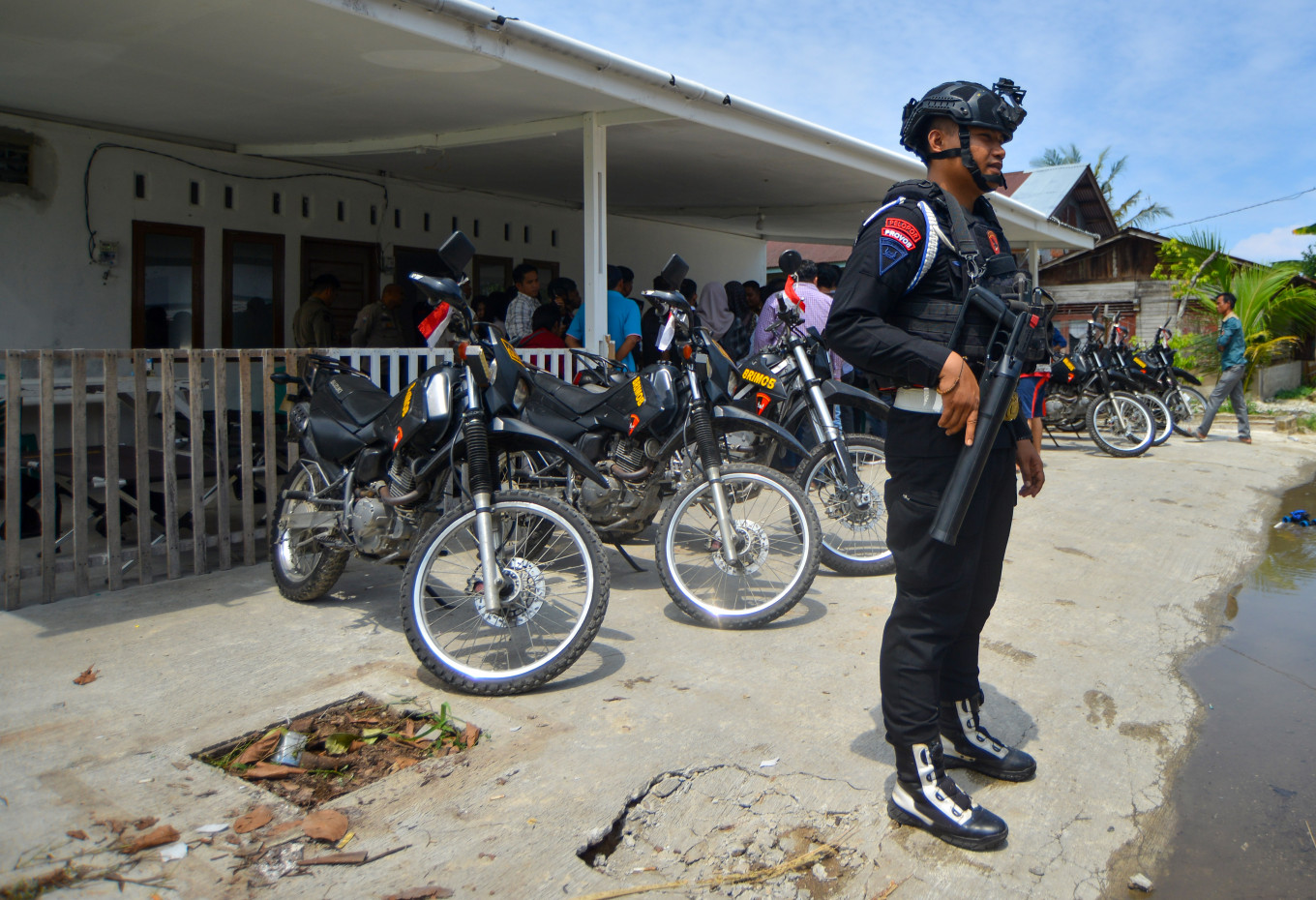Popular Reads
Top Results
Can't find what you're looking for?
View all search resultsPopular Reads
Top Results
Can't find what you're looking for?
View all search resultsAct more, regret less
The attacks on minority religious groups are manifestations of a broken, biased system that fails to protect the rights of all citizens equally.
Change text size
Gift Premium Articles
to Anyone
 A police officer stands guard on July 28 in front of a Christian prayer house following a violent disruption of religious activities in Padang Sarai, Padang, West Sumatra. A group of residents vandalized the property that belongs to the Indonesian Faithful Christian Church (GKSI) Anugerah Padang on July 27, leading to the arrest of nine individuals. (Antara/Iggoy el Fitra)
A police officer stands guard on July 28 in front of a Christian prayer house following a violent disruption of religious activities in Padang Sarai, Padang, West Sumatra. A group of residents vandalized the property that belongs to the Indonesian Faithful Christian Church (GKSI) Anugerah Padang on July 27, leading to the arrest of nine individuals. (Antara/Iggoy el Fitra)
A
fter months of troubling silence in the face of rising violence against religious minorities, Religious Affairs Minister Nasaruddin Umar has finally spoken out–expressing regret over the recent attack on a Christian prayer house in Padang, the capital of West Sumatra.
The incident, which occurred on the afternoon of July 27, saw a mob vandalize a facility being used for religious education, and the damage extended far beyond the building.
Children attending a class at the time were left with not only physical injuries but also deep psychological trauma. The images and testimonies from the scene speak volumes of the fear and insecurity now haunting religious minority communities in a province often cited as one of the least tolerant regions in this predominantly Muslim but diverse country.
In response to the attack, Nasaruddin has pledged to send a team to the city to investigate what he describes as a possible “misunderstanding", emphasizing that the incident has "tarnished the country’s image” as a peaceful, tolerant nation.
Nasarudin, also the founder of an interfaith organization, Masyarakat Dialog antar Umat Beragama (Interfaith Dialogue Society), hopes that the attack will be the last of its kind. But hope and regret are no longer sufficient.
The Padang incident occurred barely a month after a similar attack in Sukabumi, West Java—another region frequently flagged by human rights groups as hostile to minority religious practices. In that case, a Christian youth retreat held in a private residence was violently disrupted by a local mob, resulting in similar destruction and intimidation.
Perpetrators of such acts often justify their behavior by claiming they are enforcing “public order” regarding unauthorized religious gatherings. But such claims reflect a much deeper structural problem: in many parts of Indonesia, it is nearly impossible for religious minorities to legally establish formal houses of worship.
They are left with little choice but to gather in private homes or makeshift venues—settings that are then targeted under the pretext of legal or procedural violations.
This problem is rooted in the notorious 2006 Joint Ministerial Decree issued by the Religious Affairs Ministry and Home Affairs Ministry, which sets out onerous requirements for building a house of worship.
Religious groups must collect signatures from at least 60 people of different faiths and gain formal permission from both local authorities and religious affairs offices. In areas where religious intolerance is entrenched, this process is not just difficult; it is practically impossible.
The regulation has long been criticized as discriminatory and out of step with Indonesia’s constitutional guarantees of religious freedom. Instead of facilitating coexistence, it empowers the majority to veto the rights of the minority. It fosters resentment, fuels social division and, as these recent incidents show, creates the conditions for violence.
These attacks are not the result of simple “misunderstandings.” They are manifestations of a broken, biased system that fails to protect the rights of all citizens equally.
If the government is serious about preventing further attacks, it must move beyond statements of regret. It must act with urgency to dismantle discriminatory regulations, prosecute those who incite or commit violence and ensure that every citizen—regardless of religion—can worship safely and freely.
Nasaruddin’s predecessor, Yaqut Cholil Qoumas, once promised to revise or revoke the 2006 decree, but his pledge went unfulfilled. Nasaruddin now has a critical opportunity to replace the policy with one that affirms, rather than restricts, religious freedom.
Law enforcement, too, must do its part. Those responsible for the violence in Padang, Sukabumi and elsewhere must face justice for breaching a basic human right.
As national leader, President Prabowo Subianto must also make his position clear. The right to freedom of religion and belief is protected by the Constitution. Defending that right should not be negotiable. Silence or ambiguity from the highest office only reinforces the perception—among both victims and perpetrators—that the state is absent, indifferent or even complicit.
Words alone will not prevent the next attack. Only decisive, meaningful action will.










